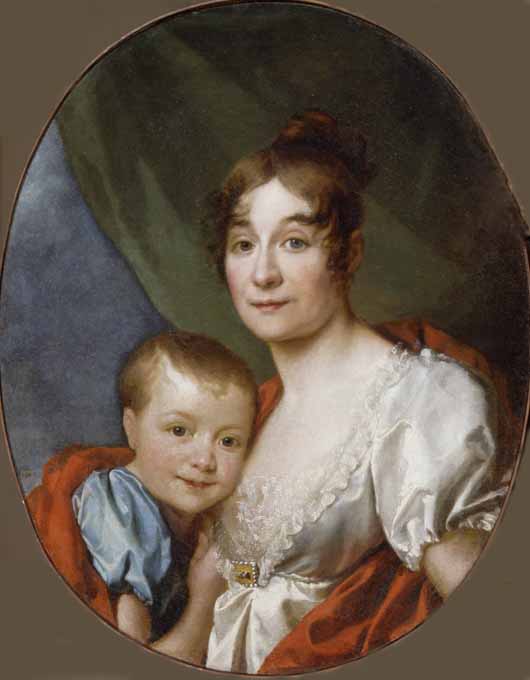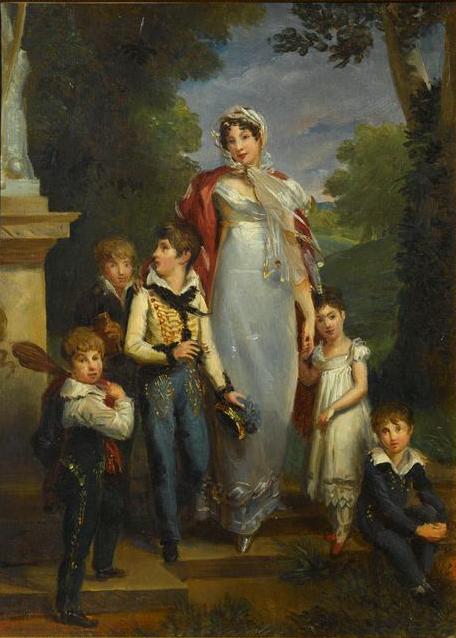When I awoke the next morning, it seemed as if all the events of the preceding evening had been a dream . While I lay musing on my pillow, I heard the sound of little feet pattering outside the door, and a whispering consultation. Presently a choir of small voices chanted forth an old Christmas carol .
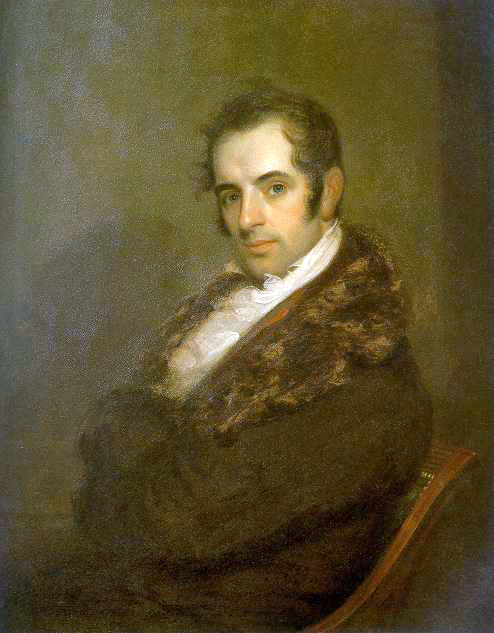
I rose softly, slipt on my clothes, opened the door suddenly, and beheld one of the most beautiful little fairy groups that a painter could imagine. It consisted of a boy and two girls, the eldest not more than six, and lovely as seraphs. They were going the rounds of the house, and singing at every chamber door; but my sudden appearance frightened them into mute bashfulness. They remained for a moment playing on their lips with their fingers, and now and then stealing a shy glance from under their eyebrows, until, as if by one impulse, they scampered away, and as they turned an angle of the gallery, I heard them laughing in triumph of their escape.
The window of my chamber looked out upon what in summer would have been a beautiful landscape. There was a sloping lawn, a fine stream winding at the foot of it, and a tract of park beyond, with noble clumps of trees, and herds of deer. At a distance was a neat hamlet, with the smoke from the cottage chimneys hanging over it; and a church with its dark spire in strong relief against a clear, cold sky. The house was surrounded with evergreens, according to the English custom, which would have given almost the appearance of summer; but the morning was extremely frosty; the light vapor of the preceding evening had been precipitated by the cold, and covered all the trees and every blade of grass with its fine crystallizations. The rays of a bright morning sun had a dazzling effect among the glittering foliage. A robin, perched upon the top of a mountain ash that hung its clusters of red berries just before my window, was basking himself in the sunshine and piping a few notes; and a peacock was displaying all the glories of his train, and strutting with the pride and gravity of a Spanish grandee on the terrace walk below.
I had scarcely dressed myself when a servant appeared to invite me to family prayers. He showed me the way to a small chapel in the old wing of the house, where I found the principal part of the family already assembled in a kind of gallery, furnished with cushions, hassocks, and large prayer books; the servants were seated on benches below. The old gentleman read prayers from a desk in front of the gallery, and Master Simon acted as clerk, and made the responses.
…
The service was followed by a Christmas carol, which Mr. Bracebridge himself had constructed from a poem of his favorite author, Herrick; and it had been adapted to an old church-melody by Master Simon.
…
I afterwards understood that early morning service was read on every Sunday and saints’ day throughout the year, either by Mr. Bracebridge or some member of the family. It was once almost universally the case at the seats of the nobility and gentry in England, and it is much to be regretted that the custom is falling into neglect.
…
Our breakfast consisted of what the Squire denominated true old English fare. He indulged in some bitter lamentations over modern breakfasts of tea and toast, which he censured as among the causes of modern effeminacy and weak nerves, and the decline of the old English heartiness; and though he admitted them to his table to suit the palates of his guests, yet there was a brave display of cold meats, wine, and ale, on the sideboard.
After breakfast I walked about the grounds with Frank Bracebridge and Master Simon. We were escorted by a number of . . . dogs, that seemed loungers about the establishment, from the frisking spaniel to the steady old stage-hound,–the last of which was of a race that had been in the family time out of mind; they were all obedient to a dog whistle, which hung to Master Simon’s buttonhole, and in the midst of their gambols would glance an eye occasionally upon s small switch he carried in his hand.
The old mansion had a still more venerable look in the yellow sunshine than by pale moonlight, and I could not but feel the force of the Squire’s idea, that the formal terraces, heavily moulded balustrades, and clipped yew trees carried with them an air of proud aristocracy. There appeared to be an unusual number of peacocks about the place, and I was making some remarks upon what I termed a flock of them, that were basking under a sunny wall, when I was corrected in my phraseology by Master Simon, who told me that, according to the most ancient and approved treatise on hunting I must say a muster of peacocks. “In the same way,” added he, “we say a flight of doves or swallows, a bevy of quails, a herd of deer, of wrens or cranes, a skulk of foxes, or a building of rooks.” He went on to inform me that, according to Sir Anthony Fitzherbert, we ought to ascribe to this bird, “both understanding and glory; for, being praised, he will presently set up his tail, chiefly against the sun, to the intent you may the better behold the beauty thereof. But at the fall of the leaf, when his tail falleth, he will mourn and hide himself in corners, till his tail come again as it was.”
I found that the peacocks were birds of some consequence at the hall; for Frank Bracebridge informed me that they were great favorites with his father, who was extremely careful to keep up the breed; partly because they belonged to chivalry, and were in great request at the stately banquets of olden time, and partly because they had a pomp and magnificence about them, highly becoming an old family mansion.
. . . .
While we were talking we heard the distant tolling of the village bell, and I was told that the Squire was a little particular in having his household at Church on Christmas morning, considering it a day of pouring out of thanks and rejoicing.
“If you are disposed to go to church,” said Frank Bracebridge, “I can promise you a specimen of my cousin Simon’s musical achievements. As the church is destitute of an organ, he has formed a band from the village amateurs, and established a musical club for their improvement; he has also sorted a choir.”
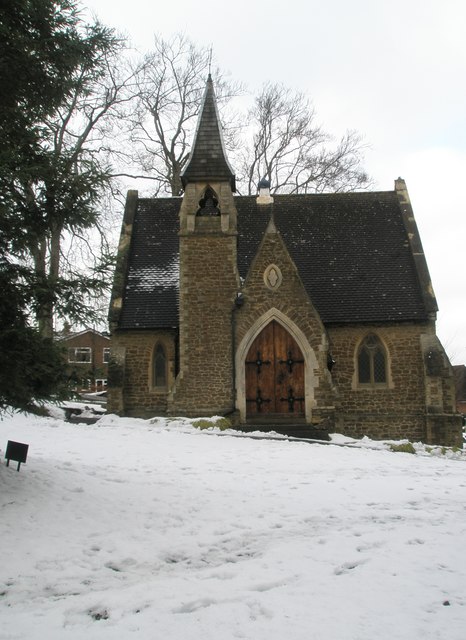
As the morning, though frosty was remarkably fine and clear, the most of the family walked to the church, which was a very old building of gray-stone, and stood near a village, about half a mile from the park gate. Adjoining it was a low snug parsonage, which seemed coeval with the church. The front of it was perfectly matted with a yew-tree, that had been trained against the walls, thorough the dense foliage of which, apertures had been formed to admit light into the small antique lattices. As we passed this nest, the parson issued forth and preceded us.
The parson was a little meagre, black-looking man, with a grizzled wig that was too wide, and stood off from each ear; so that his head seemed to have shrunk away within it, like a dried filbert in its shell. He wore a rusty coat, with great skirts, and pockets that would have held the church Bible and prayer-book: and his small legs seemed still smaller from being planted in large shoes, decorated with enormous buckles.
I was informed by Frank Bracebridge, that the parson had been a chum of his father’s at Oxford, and had received this living shortly after the latter had come into his estate.
…
On reaching the church-porch, we found the parson rebuking the gray-headed sexton for having used mistletoe among the greens with which the church was decorated. It was, he observed, an unholy plant, profaned by having been used by the Druids in their mystic ceremonies; and though it might be innocently employed in the festive ornamenting of halls and kitchens, yet it had been deemed by the Fathers of the Church as unhallowed, and totally unfit for sacred purposes. So tenacious was he on this point, that the poor sexton was obliged to strip down a great part of the [mistletoe] before the parson would consent to enter upon the service of the day.
The interior of the church was venerable but simple; on the walls were several mural monuments of the Bracebridges, and just beside the altar was a tomb of ancient workmanship, on which law the effigy of a warrior in armor, with his legs crossed, a sign of his having been a Crusader.
…
The orchestra was in a small gallery, and presented a most whimsical grouping of heads, piled one upon the other, among which I particularly noticed that of the village tailor, . . . who played the clarinet, and seemed to have blown his face to a point; and there was another . . . man stooping and laboring at a bass-viol, so as to show nothing but the top of a round bald head . . .There were two or three pretty faces among the female singers,. . . but the gentlemen choristers had evidently been chosen more for tone than looks; . . . .
The usual services of the choir were managed tolerably well, the vocal parts generally lagging a little behind the instrumental. . . .
The parson gave us a most erudite sermon on the rites and ceremonies of Christmas, and the propriety of observing it not merely as a day of thanksgiving, but of rejoicing. . . .
[O]n leaving the church the congregation seemed one and all possessed of the gayety of spirit so earnestly enjoined by their pastor. The elder folks gathered in knots in the churchyard, greeting and shaking hands; and the children ran about crying Yule! Yule! And repeating some uncouth rhymes, which the parson, who had joined us, informed me had been handed down from days of yore. The villagers doffed their hats to the Squire as he passed, giving him the good wishes of the season with every appearance of heartfelt sincerity, and were invited by him to the hall, to take something to keep out of the cold of the weather; and I heard blessings uttered by several of the poor, which convinced me that in the midst of his enjoyments, the worthy old cavalier had not forgotten the true Christmas virtue of charity.
. . . .
The Squire went on to lament the deplorable decay of the games and amusements which were once prevalent in this season among the lower orders, and countenanced by the higher; when the old halls of castles and manor-houses were thrown open at daylight;; when the tables were covered with brawn, and feed, and humming ale; when the harp and the carol resounded all day long, and when the rich and poor were alike welcome to enter and make merry.* [*Note: An English gentleman, at the opening of the great day, i.e., on Christmas day in the morning, had all his tenants and neighbors enter his hall by daybreak. The strong beer was broached, and the blackjacks went plentifully about with toast, sugar, and nutmeg and good Christmas cheese. The Hackin (the great sausage) must be boiled by daybreak, or else two young men must take the maiden (i.e., the cook) by the arms, and run her round the market-place till she is shamed of her laziness.” quoted from Round about our Sea-Coal Fire.
. . . .
We had not been long home when the sound of music was heard from a distance. A band of country lads, without coats, their shirtsleeves fancifully tied with ribbons, their hats decorated with greens, and clubs in their hands, were seen advancing up the avenue, followed by a large number of villagers and peasantry. They stopped before the hall door, where the music struck up a peculiar air, and the lads performed a curious and intricate dance, advancing, retreating, and striking their clubs together, keeping exact time to the music; while one, whimsically crowned with a fox’s skin, the tail of which flaunted down his back, kept capering round the skirts of the dance, and rattling a Christmas box with many antic gesticulations.
The Squire . . . gave me the full account of [this dances’} origin, which he traced to the times when the Romans held possession of the island; plainly proving that this was a lineal descendant of the sword-dance of the ancients. “It is now,. . . nearly extinct, but he had accidentally met with traces of it in the neighborhood, and had encouraged its revival; though, to tell the truth, it was too apt to be followed up by the rough cudgel play, and broken heads in the evening.”
After the dance was concluded, the whole party was entertained with brawn and beef, and stout home-brewed. The Squire himself mingled among the rustics, and was received with awkward demonstrations of deference and regard. . . .
The bashfulness of the guests soon gave way before good cheer and affability. There is something genuine and affectionate in the gayety of the lower orders, when it is excited by the bounty and familiarity of those above them. . . . When the Squire had retired, the merriment increased and there was much joking and laughter. . . .
The whole house seemed abandoned to merriment: as I passed my room to dress for dinner I heard the sound of music in a small court, and looking through a window that commanded it, I perceived a band of wandering musicians, with pandean pipes and a tambourine, a pretty coquettish housemaid was dancing a jig with a smart country lad, while several of the servants were looking on.
Originally posted 2012-12-24 10:00:00.
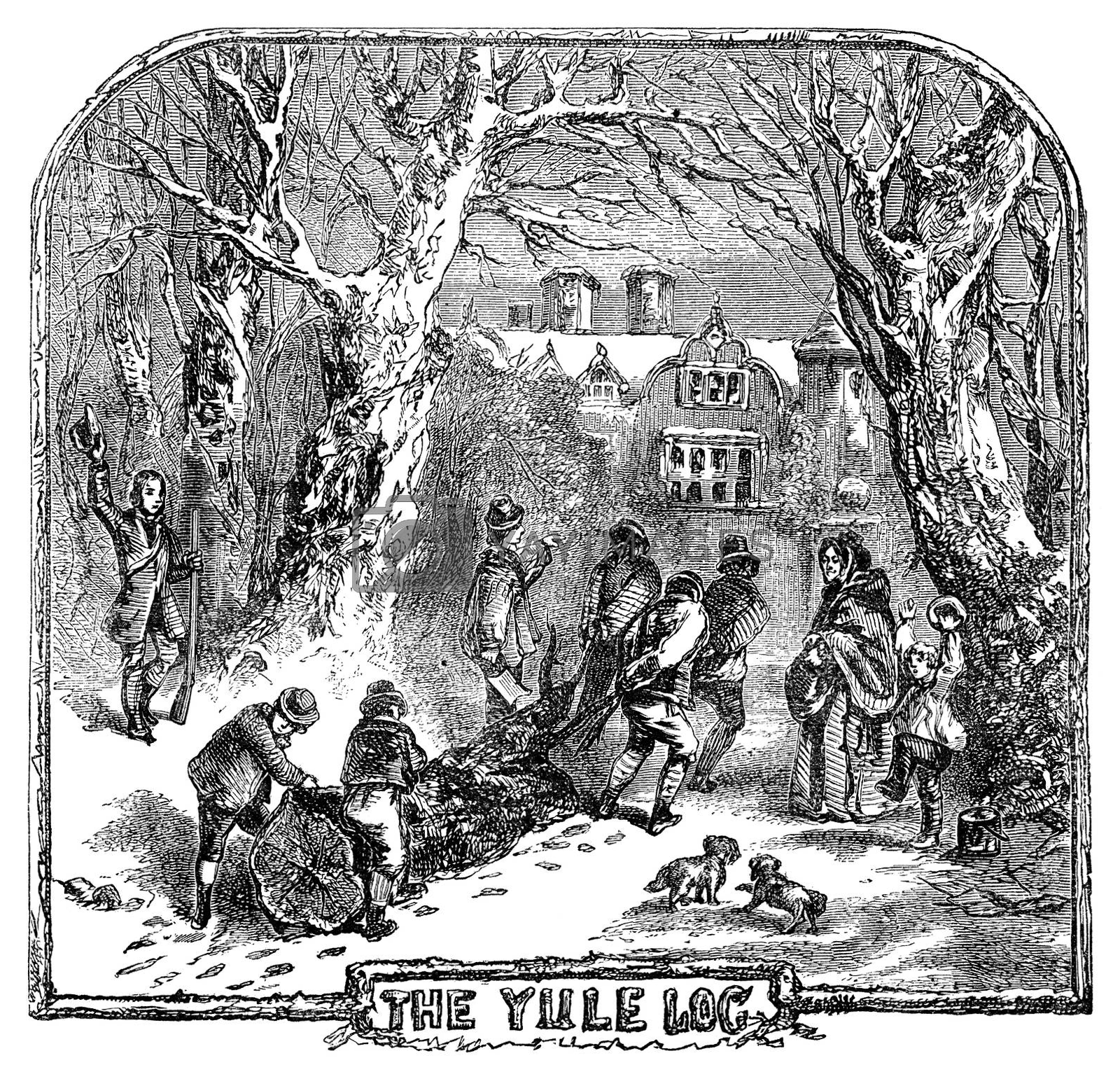
 Regency Reflection is happy to welcome Louise M. Gouge to the blog today. Be sure to check out Louise’s new book,
Regency Reflection is happy to welcome Louise M. Gouge to the blog today. Be sure to check out Louise’s new book, 

 Today we are shocked and saddened to hear of any form of child abuse, and efforts are made to save children in similar dangers. Even during the Regency era, many godly reformers sought to make changes in social inequities. But it was not until 1864 that Lord Shaftesbury succeeded in eliminating the use of “climbing-boys” through the Act for the Regulation of Chimney Sweepers, which established a penalty of £10.00 for offenders. That was a hefty sum in those days.
Today we are shocked and saddened to hear of any form of child abuse, and efforts are made to save children in similar dangers. Even during the Regency era, many godly reformers sought to make changes in social inequities. But it was not until 1864 that Lord Shaftesbury succeeded in eliminating the use of “climbing-boys” through the Act for the Regulation of Chimney Sweepers, which established a penalty of £10.00 for offenders. That was a hefty sum in those days.









